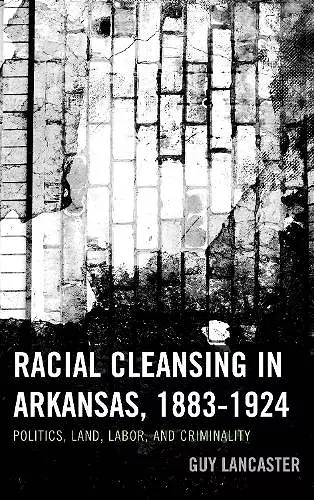Racial Cleansing in Arkansas, 1883–1924
Politics, Land, Labor, and Criminality
Format:Paperback
Publisher:Lexington Books
Published:27th Apr '16
Currently unavailable, and unfortunately no date known when it will be back

Even before the end of Reconstruction in Arkansas, the state already possessed a long-standing reputation for violence, including lynchings, duels, and feuds. However, the years following Reconstruction witnessed the creation of new forms of mob violence. All across the state, gangs of whites sought to drive African Americans from their homes, their jobs, and their positions of authority, creating communities shamelessly advertised as “100% white.” This happened not only in the highland regions, the Ozarks and the Ouachitas, where the expulsion of African Americans created so-called “sundown towns,” but it also occurred in the low-lying Delta lands of eastern Arkansas, where cotton was king and where masked mobs of landless “whitecappers” and “nightriders” regularly dealt terror and murder to black sharecroppers. Racial Cleansing in Arkansas, 1883–1924: Politics, Land, Labor, and Criminality by Guy Lancaster is the first book to examine the phenomenon of racial cleansing within the context of one particular state, illustrating how violence relates to geography and economic development. Lancaster analyzes the wholesale expulsion of African Americans and the emergence of “sundown towns” together with a survey of more limited deportations, including those with blatant political goals as well as vigilante violence. The book has broader implications not only for the study of Southern and American history but also for a deeper understanding of ethnic and racial conflict, local politics, and labor history
The work is a good analysis of racial cleansing in Arkansas in the period between Reconstruction and the end of the First World War. The concept of racial cleansing is a valuable conceptual framework in which to analyse the events of this place and time, and the concept itself is well defined and adequately frames the discussion of sundown towns. . . . [T]he author’s decision to integrate perspectives other than history to explain the existence of these communities – among them sociology, anthropology and political science – provided valuable insights into racial cleansing. . . .This work makes a significant contribution to the study of race relations, not only historically, but sociologically, by providing insights into the consequences to an area’s culture due to efforts to retain social, economic and political advantage. * Capital & Class *
This compact, well-researched volume has moments of great drama and deep tragedy. . . .Racial Cleansing in Arkansas tells tragic stories with an analytical care that helps us to learn from them. The banality of some of the evil is at times perfectly captured. . . .[T]his is a painful story well-told and well-worth remembering. * Arkansas Review *
Racial Cleansing in Arkansas, 1883-1924: Politics, Land, Labor, and Criminality is a meticulously documented and in-depth analysis of a crucial aspect of White Supremacy that has been understudied by historians. Guy Lancaster's study will serve as a blueprint for scholars throughout the United States. Though a work primarily of immense historical significance, Dr. Lancaster's treatment of the consequences of ‘racial cleansing’ is the gold standard for anyone interested in this era. -- Grif Stockley, author of Ruled by Race: Black/White Relations in Arkansas from Slavery to the Present
Guy Lancaster has advanced the boundaries of our knowledge of one of the darkest chapters in America's history. Beginning in the 1860s and continuing through the 1920s, whites conducted a series of racial cleansings, forcing blacks to flee for their lives. While the general outlines of this practice have finally come to light, Lancaster focuses on one state—Arkansas—and explains in exhaustive detail what took place. Where Lancaster has led, I hope researchers in other states will follow. -- Elliot Jaspin, Pulitzer Prize-winning journalist and author of Buried in the Bitter Waters: The Hidden History of Racial Cleansing in America
- Winner of John William Graves Book Award.
ISBN: 9780739195499
Dimensions: 226mm x 157mm x 12mm
Weight: 254g
186 pages